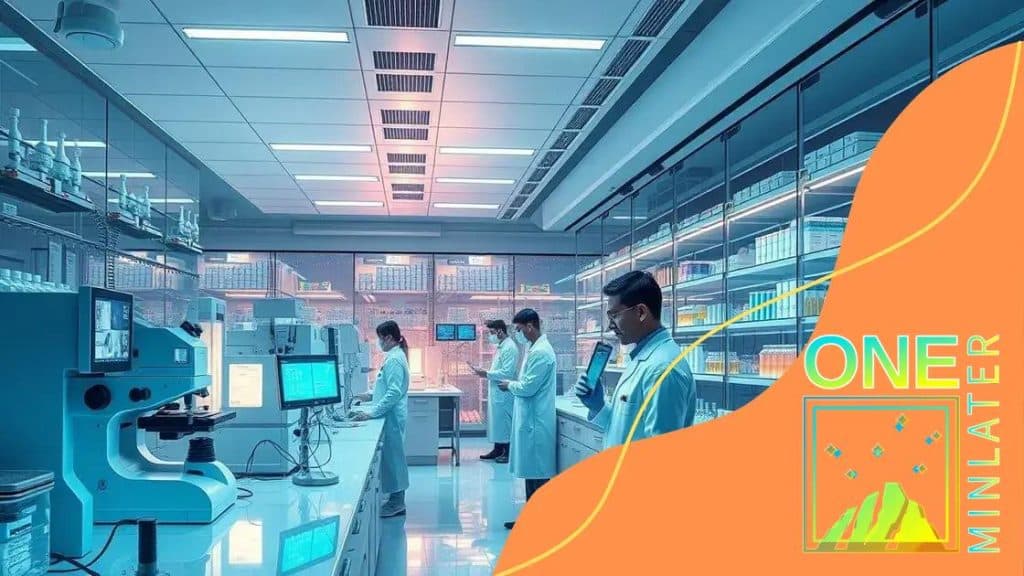Advances in biotechnology shaping modern healthcare

Advances in biotechnology are transforming modern healthcare through personalized medicine, innovative therapies, and technologies like AI and wearables, enhancing diagnostics, treatment, and patient outcomes.
Advances in biotechnology shaping modern healthcare are not just buzzwords; they represent a paradigm shift in how we approach health. Have you ever wondered how these innovations impact everyday patient care? Let’s dive deeper into their significance.
The role of biotechnology in disease prevention
The significance of biotechnology in disease prevention is monumental. It enables healthcare professionals to identify and combat diseases before they manifest. With innovations like gene editing and vaccine development, biotechnology plays a vital role in protecting public health.
Genetic Screening and Disease Risk
One of the most promising applications of biotechnology is genetic screening. This process helps identify individuals who may be at a higher risk for certain diseases:
- Early detection of inherited conditions
- Tailored prevention strategies
- Informed family planning decisions
- Enhanced understanding of disease pathways
These tools allow for personalized health plans that can significantly reduce disease onset.
Vaccines and Biotherapeutics
Another critical biotechnology application is in vaccine development. Advanced biotechnological methods have transformed global health by:
- Creating effective vaccines against infectious diseases
- Using recombinant DNA technology for better immunity
- Facilitating rapid responses to outbreaks
This has led to significant advancements in public health, especially during pandemics.
Moreover, biotherapeutics—medications developed through biotechnology—are changing the landscape of preventive care. They offer targeted treatments that can prevent the progression of chronic diseases.
As we continue to explore the potential of biotechnology, its role in disease prevention will surely expand, fostering healthier communities around the world.
Innovative therapies driving healthcare transformation
Innovative therapies are at the forefront of healthcare transformation, pushing the boundaries of what is possible in treatment options for patients. With technologies evolving rapidly, healthcare providers are now equipped with tools that offer better outcomes for various diseases.
Gene Therapy
Gene therapy is revolutionizing treatment for genetic disorders. By correcting defective genes, we can:
- Prevent disease from developing further
- Repair cellular functions disturbed by mutations
- Enhance the body’s natural ability to fight diseases
This personalized approach allows for more effective treatments tailored to the individual.
Immunotherapy
Another groundbreaking advancement is immunotherapy, particularly in cancer treatment. This therapy harnesses the body’s immune system to target and destroy cancer cells. It can lead to:
- Significantly improved survival rates
- Fewer side effects compared to traditional treatments
- Long-lasting remission in some patients
These therapies exemplify a new era in cancer treatment where the patient’s own body is used as a weapon against the disease.
Meanwhile, advancements in regenerative medicine, including stem cell therapy, have opened doors to methods that could repair and regenerate damaged tissues. Such innovations show promise for conditions that were once deemed untreatable.
The integration of these innovative therapies into standard medical practices is fundamentally changing patient care, leading to more tailored and efficacious solutions.
Ethical considerations in biotechnological advancements

As we embrace the rapid evolution of biotechnology, it is essential to consider the ethical implications that come along with these advancements. Understanding the balance between innovation and ethics is crucial for responsible progress in the field.
Informed Consent
One of the key ethical considerations is informed consent. Patients must be fully aware of:
- The procedures and potential risks involved
- How their data or samples will be used
- The implications of the treatments they receive
This transparency helps ensure that individuals make educated choices about their healthcare options.
Equity in Access
Another significant issue is the fairness of access to biotechnological advancements. There is a risk that some communities may not benefit equally from new therapies. This can lead to disparities in:
- Access to groundbreaking treatments
- Healthcare outcomes across different populations
- Overall public health improvements
Ensuring that all groups have equal access is vital for the ethical deployment of these innovations.
Additionally, we must consider the long-term consequences of genetic modifications and other biotechnological interventions. Questions about unintended effects on the ecosystem and society arise, leading to ongoing discussions about the responsibilities of researchers and healthcare providers.
As we explore the potential of biotechnology, engaging in ethical deliberations is essential to foster trust and uphold public confidence in scientific advancements.
How biotechnology is personalizing medicine
Biotechnology is fundamentally transforming how medicine is delivered, leading to a more personalized approach to patient care. By utilizing a patient’s unique genetic makeup, healthcare providers can tailor treatments that are more effective and have fewer side effects.
Genomic Medicine
At the heart of personalized medicine is genomic medicine. It focuses on using an individual’s genes to inform therapies. This approach allows for:
- Identification of specific mutations driving disease
- Customization of drug protocols
- Enhanced accuracy in predicting treatment responses
By understanding the genetic factors involved, doctors can make informed decisions about the best course of action for each patient.
Targeted Therapies
Another crucial element is targeted therapy. These therapies specifically attack the underlying causes of diseases rather than just alleviating symptoms. For example, in cancer treatment, targeted therapies can:
- Attack cancer cells directly without harming healthy ones
- Reduce side effects compared to traditional chemotherapy
- Improve survival rates for specific cancer types
This precision leads to better outcomes and a more efficient use of healthcare resources.
In addition, biotechnology facilitates the use of biomarkers to determine how individuals will respond to certain medications. This not only enhances treatment efficacy but also minimizes trial and error in prescribing medications.
Overall, the shift towards personalized medicine through biotechnology not only promotes a deeper understanding of individual health conditions but also fosters a more compassionate approach to patient care.
Future trends in biotechnology and healthcare
Looking ahead, the future trends in biotechnology and healthcare promise to reshape our world significantly. These advancements will not only change how we treat diseases but also improve overall health management.
Artificial Intelligence in Diagnostics
One major trend involves the integration of artificial intelligence (AI) into healthcare diagnostics. AI can analyze vast amounts of medical data, leading to:
- Faster and more accurate diagnoses
- Identification of patterns that human eyes might miss
- Enhanced predictive analytics for patient outcomes
This technology helps healthcare providers make informed decisions quickly.
Wearable Health Technology
Another area of growth is wearable health technology. Devices that monitor vital signs in real-time are becoming commonplace. These wearables can:
- Track heart rates, glucose levels, and activity
- Provide alerts for irregular health patterns
- Encourage proactive health management
As this technology evolves, continuous health monitoring will be more accessible and user-friendly.
Moreover, advancements in gene editing technologies, like CRISPR, are paving the way for potential cures for genetic disorders. These developments raise possibilities for eliminating hereditary diseases.
Telemedicine is also expected to grow, offering remote consultations and improving accessibility to healthcare services for patients in rural areas. This trend ensures that quality treatment is available for everyone, regardless of location.
Overall, the convergence of biotechnology and innovative technologies will drive significant improvements in patient care, emphasizing the importance of preventative measures and personalized treatment plans.
FAQ – Frequently Asked Questions about Biotechnology in Healthcare
What is the role of artificial intelligence in healthcare?
Artificial intelligence in healthcare improves diagnostics by analyzing data quickly, allowing for faster and more accurate patient assessments.
How do wearable technologies benefit patients?
Wearable technologies monitor health metrics in real-time, enabling proactive healthcare management and immediate alerts for any irregularities.
What advancements do gene editing technologies offer?
Gene editing technologies like CRISPR have the potential to cure genetic disorders by directly modifying the genes responsible for these conditions.
Why is telemedicine becoming more important?
Telemedicine provides greater access to healthcare services, especially for individuals in remote areas, ensuring that everyone receives necessary medical attention.





